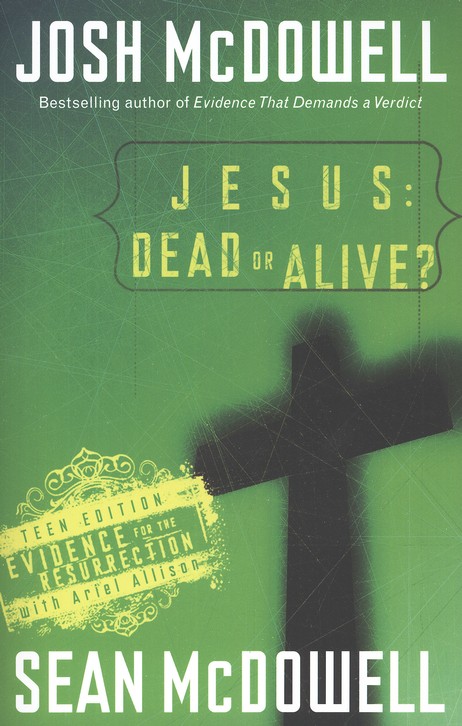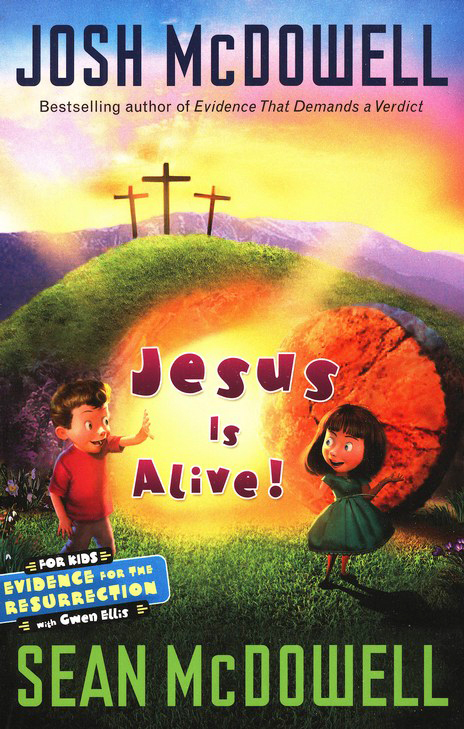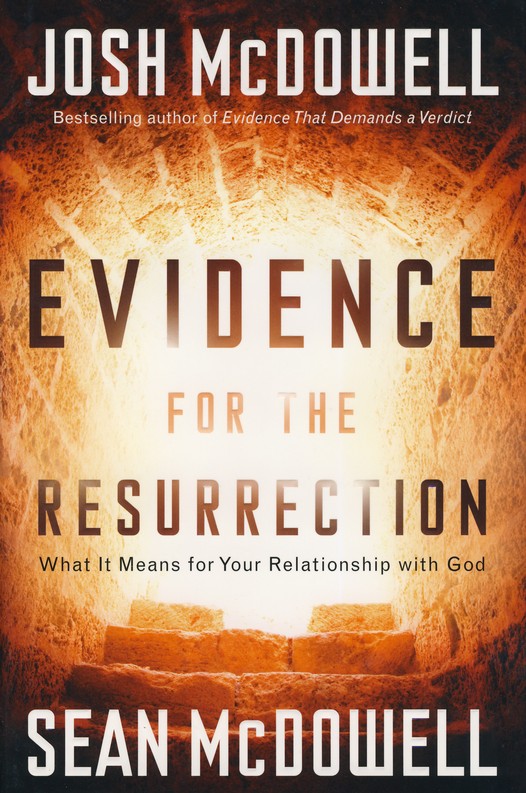Editor's Note: Josh McDowell took some time out of his travels last week to talk with Crosswalk about his new book, Evidence for the Resurrection: What It Means for Your Relationship with God. This new resource (Regal Publishers, 2009) follows in the tradition of McDowell’s previous books, using facts and logic to argue for the reality of, in this case, Christ’s bodily resurrection.
"The resurrection of Jesus Christ and Christianity stand or fall together. One cannot be true without the other," Josh McDowell and his coauthor, son Sean, assert early in the book, Evidence for the Resurrection: What It Means for Your Relationship with God. "Without the historical resurrection of Jesus, the Christian faith is a mere placebo."
Dividing the book into three sections, the authors explore the compelling evidences and reasons for the reality of the Resurrection in the third and final portion. The first two sections address the questions: "Why did humanity need the Resurrection to begin with?" and "What does the Resurrection mean to me personally?" In these chapters, the authors connect life's hard questions—about pain, struggle, disappointment, death—with God's miraculous answer in Jesus the risen Savior. Mature believers may be tempted to skip over these chapters and dive into the third section, but those interested in effectively dialoguing with unbelievers about Jesus should resist the temptation, and instead read carefully.
During our conversation last week, Josh sat on an airport lobby floor, keeping our phone appointment despite a cancelled flight and skewed schedule. “How does believing in Christ’s resurrection change our perspective on life?” I asked.
“If the Resurrection isn't true, then it really doesn't influence our life. Everything that Christ lived and died for is dependent on the Resurrection. First Corinthians 15 says our faith is worthless if he died in vain. Many believe it to be true because they want it to be true, but they don’t have the conviction that it is true. That’s why I wanted to do a definitive book on the Resurrection—to help believers understand that this event actually happened.
"The implications of it are, first, the forgiveness of sin. If Christ died for forgiveness of sin, that would not be true if he did not rise from the dead. We would still have been lost in our sin. So I have the confidence in knowing that because the Resurrection is true, I am forgiven. Christ offered his sacrifice, and God the Father accepted it.
"Secondly, if Christ were not raised from the dead, no one or anything gives us hope of eternity. If he was raised from the dead, then that means if he lives we shall live also.
"It's one thing to believe that; it’s another thing to have the conviction that it is true. A belief is assent to something; conviction is not only assent to something but knowing why you assent to it and experience it in your life."
The book walks readers through God's original intent for relationship with us when He created humanity in His image, how sin damaged His plan, and God's solution for restoring relationship with men and women. It discusses how the hope of the Resurrection not only applies to the afterlife but to our current sufferings and trials. The Church that expresses her Resurrection life in the world has the potential, and the obligation, to push back at the despair and loneliness so prevalent in society. Because we serve a risen Savior, we can share hope, healing, love, and mercy. But to do that effectively, the authors argue, we must ourselves be convinced that the Resurrection actually happened.
I asked Josh what he considered the strongest evidence of the resurrection that Christians might share with unbelieving family and friends this Easter. His answer surprised me.
"I'd give my testimony—how I came to know Christ and why I trust Him; then I’d share why I believe that the Bible is true and trustworthy, and then I’d point out the Resurrection. What convinced people of the Resurrection back then [when it happened] is not the empty tomb. What convinced people at that time were his appearances—I believe that’s the strongest evidence. When Paul said that He appeared to over 500 at one time and told the critics, 'Look, the majority of them are alive!'—he put his entire life and reputation on the line."
In addition to the empty tomb and Jesus' appearances, the McDowells point to several other favorable arguments for the Resurrection: the broken Roman seal on the tomb, the large stone rolled away, the Roman guards who fled, the graveclothes' unique positioning, and others. They also debunk common attempts to explain away the Resurrection, such as the "swooning" theory, spiritual resurrection theory, or stolen body theory. The authors address historical evidence and the reliability of the Gospel writers. Their comprehensive coverage give readers much to consider.
Coauthor and Josh's son, Sean McDowell heads the Bible department at a Christian high school in California, speaks professionally, and writes his own ministry books. He is the national spokesman for Wheatstone Academy, an organization committed to training young people in biblical worldview. He is also the father of two. "Sean gives a bridge to the younger culture," Josh told me. He calls working with Sean "a first-class act."
 The father-son duo believes that knowing the truth of the Resurrection is crucial for young people today. In conjunction with Evidence of the Resurrection, they produced two separate books for kids: Jesus: Dead or Alive? targets 13–18-year-olds, while Jesus is Alive! is designed for children 6–10 years of age.
The father-son duo believes that knowing the truth of the Resurrection is crucial for young people today. In conjunction with Evidence of the Resurrection, they produced two separate books for kids: Jesus: Dead or Alive? targets 13–18-year-olds, while Jesus is Alive! is designed for children 6–10 years of age.
 "You’d be surprised what kids five or six years old can understand," Josh told me. "Jesus is Alive! presents the information in a Q&A format. A child can grasp a lot, especially when it comes from the parents. If you don’t reach a child by his 12th birthday, you can’t really reach him. Only 4 percent come to Christ after that. So if you are going to reach a child by his 12th birthday, you have to start at five or six."
"You’d be surprised what kids five or six years old can understand," Josh told me. "Jesus is Alive! presents the information in a Q&A format. A child can grasp a lot, especially when it comes from the parents. If you don’t reach a child by his 12th birthday, you can’t really reach him. Only 4 percent come to Christ after that. So if you are going to reach a child by his 12th birthday, you have to start at five or six."
The teen book communicates the material through dialogue, a format that appeals to youth. "Truth without relationships leads to rejection. If parents don't have close, loving, intimate relationships with their child, the child will often reject what the parent shares. Share with them. Don’t preach at them."
 Readers can find a free, six-page downloadable Evidence of the Resurrection pamphlet online at www.josh.org/risen. It contains a condensed explanation of the evidences put forth in the book.
Readers can find a free, six-page downloadable Evidence of the Resurrection pamphlet online at www.josh.org/risen. It contains a condensed explanation of the evidences put forth in the book.
Kelley Mathews, Th.M. (Dallas Theological Seminary), married and blessed with three young children, spends her spare time freelancing as a writer and editor. She served several years as the Women’s Ministry Director at Rowlett Bible Fellowship. Her newest book release is Leading Women Who Wound (Moody, Feb 2009), which can be found on her web site www.newdoors.info.